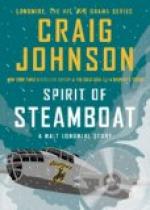[Footnote 5: A young seal.]
The young wife was very restless at this point, and, though she did not look up, I saw her tears. The stout fisherman smoothed out the net a little upon his knee, and drew it in closer, and heaved a great sigh: he did not look at his hearers.
“When ‘e throwed it down, it walloped, an’ cried, an’ soughed,—an’ its poor eyes blinded wi’ blood! (’Ee sees, Sir,” said the planter, by way of excusing his tenderness, “they swiles were friends to I, after.) Dear, O dear! I could n’ stand it; for ‘e might ha’ killed un; an’ so ‘e goes for a quart o’ rum, for fetchun first swile, an’ I went an’ put the poor thing out o’ pain. I did n’ want to look at they beautiful islands no more, somehow. Bumby it comed on thick, an’ then snow.
“Nex’ day swiles bawlun[6] every way, poor things! (I knowed their voice, now,) but ‘t was blowun a gale o’ wind, an’ we under bare poles, an’ snow comun agen, so fast as ever it could come: but out the men ‘ould go, all mad like, an’ my watch goed, an’ so I mus’ go. (I did n’ think what I was goun to!) The skipper never said no; but to keep near the schooner, an’ fetch in first we could, close by; an’ keep near the schooner.
[Footnote 6: Technical word for the crying of the seals.]
“So we got abroad, an’ the men that was wi’ me jes’ began to knock right an’ left: ‘t was heartless to see an’ hear it. They laved two old uns an’ a young whelp to me, as they runned by. The mother did cry like a Christen, in a manner, an’ the big tears ‘ould run down, an’ they ’ould both be so brave for the poor whelp that ‘ould cuddle up an’ cry; an’ the mother looked




